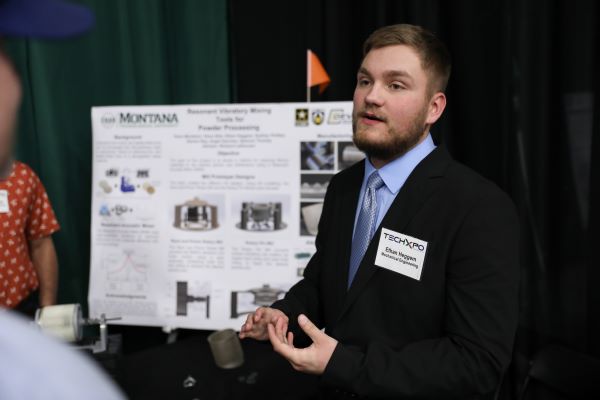Heggem receives prestigious NSF Graduate Research Fellowship

Montana Technological University mechanical engineering student Ethan Heggem has been awarded a prestigious research fellowship.
Heggem, a senior from Butte, has been selected to receive the 2025 National Science Foundation (NSF) Graduate Research Fellowship. The five-year Fellowship provides three years of financial support, including an annual stipend of $37,000.
“It is a well-deserved honor for Ethan and I am not surprised in the least that he won the Graduate Research Fellowship,” Mechanical Engineering Department Head Dr. Richard LaDouceur said. “He is a fantastic researcher and student who works very hard and cares about the quality of his work to a level that is exemplary. Luckily, he will be staying at Montana Tech working in the CHAR Lab for his graduate research and I get to continue to see what he thinks up, develops, and accomplishes!”
Heggem is currently on track to complete both his bachelors and master’s degrees in engineering in an accelerated, five-year format. He originally planned to work in industry after completing his master’s next year, but now, his options are wide open.
“I have a lot more opportunity and potential to do more now,” Heggem said. “It’s opened doors.”
Heggem enjoys conducting scientific research.
“I like the freedom and opportunity research presents for you to come up with innovative ideas, not just your standard engineering projects, but to actually explore something that hasn't been done and develop a novel solution to a problem that has not yet been solved,” Heggem said.
He also enjoys the challenge of proving his engineered solutions work.
“The biggest challenge, specifically with research, is navigating sections of unknown knowledge where you're trying to figure out how to conduct your experiments and how to tell if your results are viable,” Heggem said. “Before you can prove or disprove something, you need to know how to actually verify that your approach is correct. There's an extra step to it when there's no standard procedure on how to know if what you're doing is right or wrong.”
Heggem’s love for research developed over the past three years. At the end of Heggem’s freshman year, LaDouceur invited him to join the Montana Tech Carbon High-Temperature Advanced Research (CHAR) Laboratory as a research assistant. The lab is supported through research grants provided by the DEVCOM Army Research Lab, investigating novel Rare Earth Element (REE) extraction and mobile power generation systems to support the Army Modernization Strategy. All of the research involves biomass processing and specifically biochar. Biochar resembles charcoal, and is the substance that is left over after biomass has been burned. It is a common soil amendment, is light weight and is a renewable/natural resource.
Heggem was assigned to work with Dr. Amirhosein Riahi, who graduated from the Earth Science and Engineering program in May 2024.
“We were working on CO2 adsorption using biochar,” Heggem said. “We were collecting CO2 from ambient air for climate reclamation purposes, using biochar to absorb it. CO2 clings to the surface of the biochar and is removed from the atmosphere.”
Heggem and Riahi were listed as co-authors of an article in the international, peer-reviewed journal Carbon Trends. “Enhancement of CO2 Adsorption Kinetics onto Carbon by Low-Frequency High Amplitude Resonant Vibrations,” was published in June 2024, with LaDouceur and Dr. Mario Caccia listed as co-authors as well.
In addition to conducting research in the CHAR Lab, Heggem has also completed two internships with Signal Peak Energy and EPC Services Company. Those experiences have also piqued his interests in possibly building a career in the energy industry.
“It’s a very useful and prominent industry,” Heggem said. “It's something that we will always need; we're never going to not need power, and I think it's really important to be able to work on something that impactful.”
Heggem’s advice for other students pursing prestigious national awards is simple.
“Take the opportunities that are presented to you,” Heggem said. “On the path that I took to get here, I always worked hard to do well in school, which led me to the opportunity to take a research position after my first year of college. My next piece of advice would be to keep pursuing what inspires you. Through all the projects, conferences, and other facets of my research, things snowballed into having enough experiences to illustrate my hard work, dedication, and future potential, affording me the opportunity to compete for a national award, for which I am extremely grateful.”